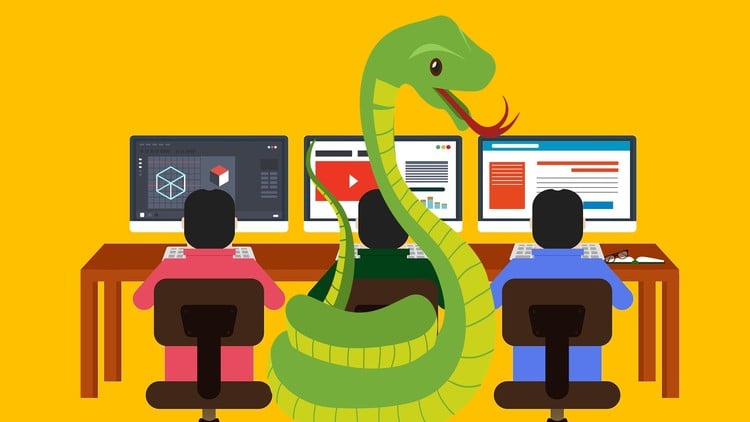
Quickly learn how to create software applications.
⏱️ Length: 4.8 total hours
⭐ 3.90/5 rating
👥 6,672 students
🔄 February 2025 update
Add-On Information:
Note➛ Make sure your 𝐔𝐝𝐞𝐦𝐲 cart has only this course you're going to enroll it now, Remove all other courses from the 𝐔𝐝𝐞𝐦𝐲 cart before Enrolling!
-
Course Overview
- This ‘Jump-Start’ offers a streamlined, “critical path” introduction to software development for absolute beginners.
- Experience rapid learning to quickly create functional applications, bypassing unnecessary complexities and focusing on core essentials.
- In just 4.8 hours, gain a robust foundational understanding, transforming from a novice to someone capable of basic software creation.
- The curriculum is designed for maximum efficiency, ensuring every minute contributes directly to practical programming skills.
- Cultivate a programmer’s analytical mindset, enhancing problem-solving beyond just writing code.
- Benefit from a project-based approach, ensuring immediate application of concepts and tangible results.
- An ideal launchpad for aspiring developers, data enthusiasts, or anyone seeking to understand modern software.
- Content is fresh and relevant, with a February 2025 update incorporating current industry practices.
-
Requirements / Prerequisites
- No Prior Coding Experience: Absolutely none is required; this course is for complete beginners.
- Basic Computer Literacy: Familiarity with essential computer operations like file management and web browsing.
- Stable Internet Connection: Required for accessing all course materials and potentially development tools.
- Functional Computer: A standard desktop or laptop (Windows, macOS, Linux) capable of running web browsers.
- Curiosity and Willingness to Learn: The most vital prerequisite is an eagerness to explore and practice new logical concepts.
-
Skills Covered / Tools Used
- Foundational Computational Logic: Understand core programming constructs like conditions, loops, and sequencing.
- Structured Problem-Solving: Learn to decompose complex tasks into manageable, codable steps.
- High-Level Data Interaction: Grasp how applications store and exchange information, including with external programs.
- Developer Environment Familiarity: Become comfortable using basic tools for writing, running, and debugging code.
- Basic Version Control Concepts: Understand the importance of tracking code changes and collaborative development.
- Introduction to App Architecture: Learn the fundamental structure of simple software applications.
- Persistent Data Storage Basics: Understand the principles of saving and retrieving application data long-term.
- Leveraging Open-Source Principles: Gain awareness of using and integrating community-driven code components.
-
Benefits / Outcomes
- Develop a Logical Mindset: Cultivate systematic thinking to approach and solve various problems effectively.
- Build Initial Coding Confidence: Overcome beginner intimidation and feel empowered to write your first programs.
- Solid Foundation for Growth: Establish a strong conceptual base for pursuing more advanced programming topics.
- Create a Functional Project: Develop a tangible application suitable for a beginner’s portfolio.
- Demystify Software Mechanics: Gain insight into how everyday applications process data and interact.
- Efficient Development Workflow: Learn practical steps for managing personal coding projects from inception.
- Understand Tech Terminology: Become fluent with basic programming jargon, aiding future learning and discussions.
- Empowerment through Automation: Begin recognizing opportunities to automate tasks using code.
-
PROS
- Highly Condensed & Efficient: Delivers maximum foundational knowledge in minimal time (4.8 hours).
- Absolute Beginner-Friendly: Designed with no prior coding experience assumed, ensuring accessibility.
- Strong Practical Focus: Emphasizes building real applications and immediately applicable skills.
- Comprehensive Fundamentals: Covers essential programming concepts crucial for any future development path.
- Clear Learning Path: Expertly curated “critical path” avoids overwhelming learners with irrelevant details.
- Introduces Professional Practices: Provides early exposure to design, testing, and version control concepts.
- Tangible Project Output: Students finish with a working application to demonstrate skills.
- Up-to-Date Content: Recently refreshed (February 2025) to ensure relevance with modern tech.
-
CONS
- Due to its extremely condensed nature, the course offers foundational introductions rather than deep dives, requiring further specialized study for advanced mastery.
Learning Tracks: English,IT & Software,Other IT & Software
Found It Free? Share It Fast!